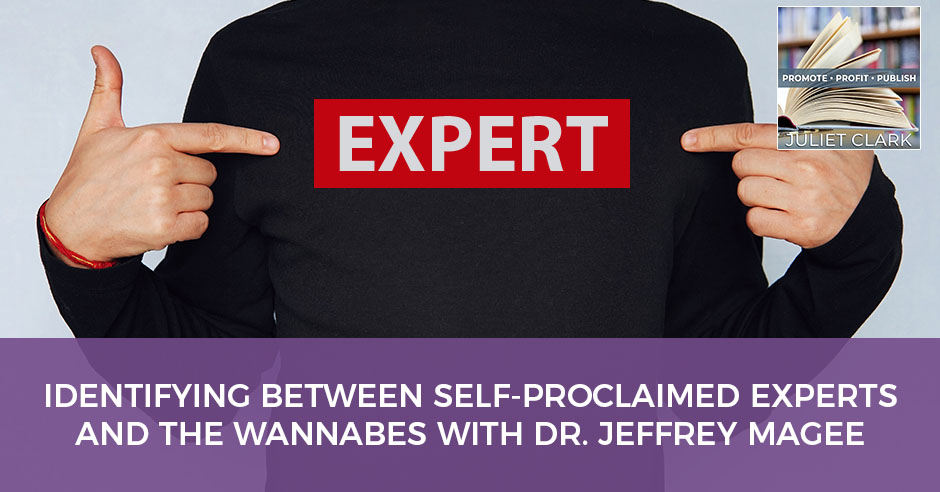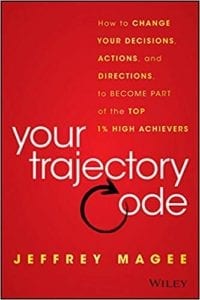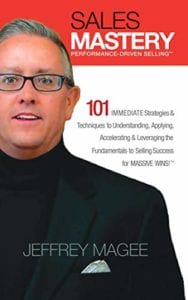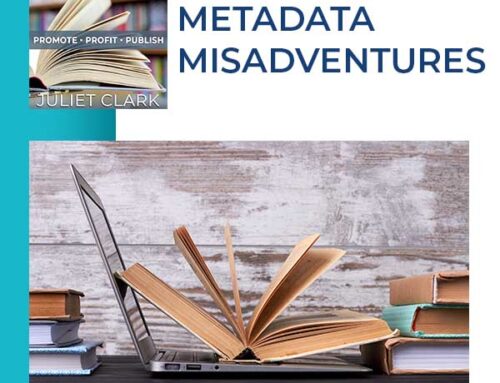
Many people call and claim themselves as experts. Especially when attending events, almost everyone you see is an expert in some way. However, as the numbers continue to grow, so is the confusion attached to figuring out who really to believe. One of today’s leading leadership and marketing strategists and executive and corporate development expert, Dr. Jeffrey Magee, distinguishes the boundaries between the self-proclaimed experts and the wannabes. He shares some markers that you could use to identify the kind of person someone claims to be, whether you are in events or simply picking out a book. At the heart of it, Dr. Jeffrey discusses the importance of deliverables, showing the ability to question what people actually offer – whether or not it is a need that will help others or just a get-rich-quick scheme.
—
Watch the episode here:
Listen to the podcast here:
Identifying Between Self-Proclaimed Experts And The Wannabes with Dr. Jeffrey Magee
I want to have you go over and take our Promote, Profit, Publish quiz. It’s www.PromoteProfitPublishQuiz.com. Find out if your skill set is up to where you need to be to make money with your products and services before your book is ever published. In this episode, I have and I’m excited about this, Dr. Jeff Magee. Dr. Jeff Magee brings over many years of executive and corporate development expertise, with the last several years working in both the startup and mature-growth market business sector and with differing State National Guard Adjutant Generals across America.
Jeff has and does maintain long-term clients working with association and organizations at the Board level and across the C-Suite. Beyond this, the importance of working with an organization’s entire human capital platform from onboarding, integration and sustained engagement is critical for an organization’s health blueprint. Jeff works with organizations, profit and nonprofit, private and public sector in the multimillion-dollar earnings market through $6 billion earnings market. Understanding the reality of hard work and ethics and drive from an early age, raised on a farm, Jeff started his first business at age fifteen and sold it before going to college. Did that finance college?
It did finance college and a lot of other things.
By the age of 24, he was recognized by American Home Products, a Fortune 500, company as its top salesman in the nation, while at the same time becoming the youngest certified sales instructor for the Dale Carnegie Sales Course. After experiencing downsizing in 1987, he went to work as a sales associate for the nation’s largest educational and youth advertising marketing firm, Target Marketing and was promoted to Vice President of Sales and Chief Operating Officer within a couple of years. You’re going to have to share your accomplishments since then, but welcome. I’m excited for you to be here.
Thank you very much.
Our topic is going to be something that has become near and dear to my heart. I usually don’t go to events where we have an author that is driven at the end. I’m not much for those anymore. I’m more about the workshops where we have deliverables and we bring people into work. I’ve had some big revelations. We’re going to talk about are you a self-proclaimed expert or are you a wannabe? When you’re out at these events, how do you identify and tell the difference?
What you framed there for your audience now and in the future is critical. Who do you go to for advice, wisdom and counsel? Who do you invest in to build your own personal business practice or your business if you’re scaling and have employees and staff, whether they’re virtual or residential or where you live and work is critical? If you look at LinkedIn, which is a phenomenal platform and you look at people that are identifying themselves as coaches, consultants, experts or professional speakers. Every day that number morphs by I don’t know what, but it is morphing. It’s alarming as to who believes they have the right, the benefit and the urge to share their mental DNA. It’s great that they have the self-confidence to want to do it, but there’s a tremendous amount of derailment happening. People are good at self-marketing, but they have no deliverables. They should never be allowed to even speak in public is how bad they are.
One place to start here is let’s define what a deliverable is because a lot of people when they go to events, they get hyped up. They get excited about, “I’m here. I’m learning. This person’s a guru,” but they don’t understand deliverables.
You can look at deliverables whether they’re tangible or intangible because that’s the first place to start. We have great companies in American history that the entire economic engine of our country was benchmarked off of. I’m sure all your audience remembers companies such as Ben Franklin, Five & Dime, Woolworth, Montgomery Ward, Sears and Roebuck. Those were the great companies that built America if you go back 100 years ago. If any of those names are not familiar to anyone, then there’s your clue because they’re all basically out of business now. The reason for that is not that what those deliverables were ceased to exist. It’s that the organizations, leadership or key stakeholders did not stay relevant and current for how those deliverables needed to be engaged in the marketplace.
We’re going backward in time. I’m sure in the late 1990s to early 2000s, someone working in Sears, as an example, a giant of American mercantile had to have had kids that were on the internet. I’m sure they went to other stores to buy but they were not looking at what are the deliverables people want to buy now and recognizing, “We’re not selling that. We’re selling outdated stuff. Our store looks like a dump and it pushes people away. No one wants to come by.” Those history lessons are important to answer the question of what deliverables are, because a lot of times the deliverable they need isn’t changing but how they want to receive it is. It’s either a tangible or intangible but in either case, it serves a need.
Deliverables have to address the need. Click To TweetYou go anywhere as your audience is participating now. You’ve got to keep your clothes clean. Whether you’re sending it out to someone else or you’re doing it yourself, there’s going to be some cleaning machine to take care of your clothes. We’re wearing clothes. Someone’s going to have to make these and we’re going to have to get them somehow, whether they’re delivered to our home or we go somewhere to get them. The concept of deliverable, if people would stop and think, they would not be investing tremendous amounts of money in stuff that they get mad about and then blow up the internet by saying, “I got nothing.” The deliverables, first of all, what is your need? Where are you now? Where are you trying to go? Once you understand that trajectory, which is one of the things I talk about in my book Your Trajectory Code, then you say, “How do I get there? What are the key performance indicators, the stepping stones to get there?”

Your Trajectory Code: How to Change Your Decisions, Actions, and Directions, to Become Part of the Top 1% High Achievers
A book by John Wiley, the largest trade book publisher in the world, served a need because I primarily live in the business world and sales are where I grew up. All of my books, audios, videos, online learning portals, white papers, articles, blogs and vlogs. I just gave your audience a long list of deliverables that speak specifically to those two spaces. I had one of my customers, she came up and said, “Jeff, your concept that you talk about in Your Trajectory Code that we’ve been using in leadership for years, I used at home with my kids and my husband and we have a phenomenal house. The reason I used it was I had one boy started going the wrong trajectory, another boy in the right trajectory. I had to get them on the right trajectory together.” That was the scene. I can create a new deliverable and write my own personal success book.
Deliverables have to address the need. They should be tangible or intangible. They should be legitimate in the stepping stones to get there. If the front side you’re going to buy something and none of that’s being added up to, you haven’t got to the vendor list that you have in your hand and you’re like, “You shouldn’t be buying,” and then ask for the person. Whenever I buy books or whether it’s in this book or my sales book or a college textbook, one of the things I always do is I jump to the about author page, whether it’s inside, back cover and quickly read the author. Authors are going to fall into three categories and then you’ll know what deliverable you’re going to get. You’re going to have authors that have a tremendous academic mindset on their top, which means you’re going to read a theory book. That’s perfect. We need some of that. You’re going to have authors that have got their brains and hands dirty in life, you’re going to have a practitioner’s book that you can use now.
The third is a book that’s a complete joke. It’s made up. It’s all lies but it looks beautiful. The author is a one-trick-pony because they probably stole the idea from someone else. They worked at Gallup. They had access to inside information. They wrote a book and become a wonder or that worked at a marketing company or they worked at a consulting company and had access to data. They basically took that data, which in other businesses would have got them sent to prison. They write a book on something and everyone got excited so no one’s going to raise your hand and say, “You outed me because you said something nice about me, that’s good.” They have no follow-up. I call those basically disingenuous people and books because people get excited about that deliverable, but they can’t put their arms and hands around anything because there’s nothing there. It’s like cotton candy. It looks good and then it’s gone nothing.
I want to speak to that last group that you talked about as well. When I first got into the publishing business, we took on an author who got stuck on a chapter of her book. The writing coach came to me and said, “I don’t know why we’re stuck on this joint venture piece.” I called up the potential author and I said, “Why are we stuck here? How many times have you done this?” It turned out she’d never done this. She was writing a book, six figures in six months. Joint ventures were the way to do it, but she’d never participated in one. She was stuck.
If you’re going to pay to go to an event, an expo, a conference, a bootcamp, a summit to learn how to get from where you are to where you want to be and that person’s saying, “I can show you the pathway.” Are you going to buy a book on that same topic? You need to ask questions about the author. If I’m going to go to an event and someone’s going to talk about how to make six figures from the stage as a speaker, I’m going to want to ask that person, “Give me three to five names I can call and talk to right now that hired you to come to speak at their event. That they can attest to the fact that you sold six figures of product at the back of the room or that organization paid you six figures to come on the stage.” If they can, by all means, you need to be there because you’re sitting at the feet of someone who has tremendous IP who can help you.
Here’s a better pop quiz. Everyone has a smartphone nowadays. You’re talking to someone about they want you to come to their event. Whatever it is, pay $500, $50,000, it doesn’t matter, to learn how to be great. You should say, “Can you grab your phone and pull up someone’s name in there.” Ask them, “Give me the names of three or four people in your phone,” because everyone has a contact list. Say, “Can I call and talk to those people?” If you can’t give someone information on what they want, you can bet that you’re about ready to deal with an absolute BS artist. You can pull up names. You can pull up highly sensitive names but don’t matter.
I publish a national magazine and for over a decade that person wrote from my magazine. He’s the President of the United States. It doesn’t matter. I’ve had President Obama, President Clinton write. To talk to people that are going to be able to legitimately give you something. Quit dealing with people that are complete BS artists. Have them pull up their voicemail. Have you had a message from someone? There are all kinds of people out there you can talk to. There’s coach Bob Knight. Who works with you? That statement you get and I’ve given you three ways to vet someone for legitimacy or BS.
Tell me someone who’s paid you. Give me plural answers. Grab your phone. Give me two or three people that I can call and talk to, to prove that you are selling me on this that you’ve ever done. “Magee, you did $10,000-plus every time you walk out on stage for Corporate America. Were you working with the military? Give me some of those names.” I can give you names right now. Where I was last week, where I’m going to be tomorrow, where I’m going to be for next month. I can show you my calendar. I’m booked for two years out legitimately doing this stuff. I’m not the person out there that has the major brand recognition of name because I’m only touting me. You hit a vein and I’m excited about it, Juliet because we got to help your audience to recognize. Some of these people are out there for themselves and they have no genuine interest in helping you.
That is one of the things that we’ve started doing at our own company. Not lifting up the phone, but if somebody needs testimonials. I’ll give them five names, five numbers. You pick who you want to call, talk and see if you get results. I don’t think there are many marketing companies out there that will do that. They’ll send you to the website. You can fake all that over on a website. I let a company go because I realized after I kept pressing that they were faking the testimonials on their website.
I’ll give you one better. I’ve had employees leave my company, start their own business and copy paste my own credentials and bios as their first person. It blows your mind. I’ve had people that I’ve liked and it was hard to let go of them in my life. It was hard to believe they would do exactly what you said. They were completely manufacturing their life. If you go on the internet and you started looking at social mediaville. Someone has a company and a website and everything, but few people especially younger people go back in social mediaville because once you put something out there, it’s never down. We started finding this one person had a whole new identity and company about every year for the past many years. We published a national magazine and have had phenomenal people write for it and phenomenal people don’t make up their credentials. They also have been genuine in wanting to help other people.
Tell us some of the ways. I have this article that you have on your website about the Self-proclaimed Expert or Wannabe. Can you tell us some of those things that we should be on the lookout for? You gave us some great examples, but if we’re looking at a bio. We’re getting ready to go to an event. Somebody’s called and said, “Everybody at this event has paid $15,000 to be there.” What should we be looking at for the leaders of that event and if this is an imposter or somebody who’s going to do some good in the world?
One, our audience can go to my website, JeffreyMagee.com. You can request the document that Juliet talked about. Let’s answer it directly to the way you posed the question, but I’m going to go to an event and there are other people there and I’m being told it’s going to cost X amount of money. I would say, “Can you introduce me to a half-a-dozen of the other attendees? Can I get a list of all of the registered attendees so far?” and the person who says why then you can say, “I want to make sure I maximize my time at your events. I want to see some of the other people that are going to be there that I can network with and collaborate with.” That’s a genuine statement to make, but you also are then at the same time going to be able to vet the other person. Whenever I go to a conference, that’s one of the things I ask. A lot of times they’ll say, “The list is not available. We don’t let them have that.” I say, “I can appreciate that. I’m about to make a sizable investment in time.” Not necessarily money. Forget the money.
What our audience is going recognize is whether it’s $5,000 or $50,000, we can talk obscene numbers. You can get and lose money and you can get and lose money again and you can get and lose money a third time in your life. What you’re never going to get back though again is time. Time is more valuable than anything else no matter how rich or poor you are. It’s a great equalizer because we all have the same amount of time. There’s no way you can buy more time. You’ve got to be smarter with your time. “That’s why I’m asking for the list because I want to know who else is going to be at this event. There’s a lady named Juliet Clark. I see what her business is. She helps authors finish the line in any way you want. I’m an author. I want to network with this lady and get a chance to meet her. I might even want to get on LinkedIn and link with her. Maybe have an exchange with her before the event and coordinate having coffee when I get to this event with her.” That’s one powerful way to vet the legitimacy of it. Even when you’re talking with the other three or four people, you can find out why you are going. What are you trying to accomplish? Mutual reciprocity, I might be able to help you grow and then I can then go to the question of, “I’m making a major investment of $5,000 to be at this event, Juliet. Are you making the same investment?” What you’re trying to find out is are we all paying the same amount? You can get there by a whole series of steps.
In social mediaville, once you put something out there, it's never going down. Click To TweetA second way to vet the event is have you done the event before? Go to their website. Do they have testimonials from people that are worded text or videos? I put testimonials up a long time ago. I realized I’m not putting the person’s entire name and business there because other people will then stalk them. I’ve had some people go, “You don’t put the whole name and company. Is this legit?” It’s like, “You want to talk about legit, bring it on. You give me your name and phone number. You’re legitimate about coming? I will facilitate email introductions to every introduction I have on LinkedIn or on my websites.” That calls out the bluff of the people that are full of themselves. Look at the videos. I don’t mean to sound disrespectful, but birds of a feather flock together. When you look at videos and you see a bunch of people that you would think, “I’d never even hang out with them to be blunt,” then you might want to reconsider or maybe not. People will try to elevate themselves in life, but I’m giving you common sense answers. There are a whole lot of ways.
You can go to people’s websites. See what they say they do. The speaker, the event you’re going to. If they’re going to help you become a coach, a consultant, a speaker, a trainer or an author, those five are critically important. If you can wear any one of those hats, you can wear all five of those hats. Anyone of them you can monetize. Others might be lead generators to your business. You may not monetize a couple of those. If I’m a speaker, trainer, author, coach, consultant and you go to that event, what’s the platform that person says they are and ask them. Being self-published takes on a whole different meaning than it did in 2001, let’s say, or 1999. It used to be, back up a decade-plus, you’re self-publishing because you had nothing legitimate to say and no one legitimate wanted to publish you. With all due respect, it looked like a joke. No one’s going to tell you that.
Now, self-publishing’s a legitimate industry and there are major publishing houses out there that work with people that don’t want to go to the John Wiley, the McGraw-Hills. That doesn’t want to go to Pearson Education. You can go to the big boys. I’ve got a lot of those books with the big boys, but I also sometimes self-publish because then I can customize the foreword. I can sell to a client that I’m going to walk on a stage and speak to 140 people or 1,400 people or 14,000 people. It becomes a revenue generator. I can sell the foreword of my book to someone. Now it’s customized to their group. The book might cost me $3 to print. I can charge them $10. The book price might be $40. I’m making $7 a book times 1,000 people. Do the math. That’s why I’m making bank. You get smart. Those are things in real business. If the person on stage is not telling me things like that, we just answered Juliet’s question. You got someone on stage that’s great at selling themselves and has stuck it to you. Ask questions. Are they legitimate? Those are a couple of quick ways to answer that question.
You came up with an idea that I’ve never even thought of when I’m speaking on someone else’s stage because it isn’t that much to re-upload with a new foreword.
There used to be a group in the country called the United States Junior Chamber of Commerce, USJCC. In 1921, they started with a mandate to help young men and women to develop their business leadership skills in the local community. It’s a beautiful mandate and mission statement, still valid now. They were the first association in the United States to have over one million members. Now, they’re basically almost out of business and extinct because their national leadership forgot their mandate and they went off track. Their deliverable started to suck. Young people are not going to join an organization where the deliverable sucks.
For years, that’s exactly how I created thousands and thousands of dollars of profit and revenue. Whenever I’d write a book, I would basically sell them the foreword because their president changes every year. They’re normally elected. I’d tell the president, “Write the foreword. Here’s the book. I’m speaking to the national convention. Everyone gets a book. They loved it.” I also beta tested a lot of my new books. I got them to pay for my inventory. They gave me the new free books to sell to other people. I could use that book and that sales traction to then go to the big trade houses to make the case through my book queries of why buy my book. Everything has a strategy.

Self-Proclaimed Experts: Time is more valuable than anything else no matter how rich or poor you are.
What Juliet and I did is an example of what should be happening on stage to any event you pay to go get money for. What’s the deliverable? They’re going to be able to tell you that and show you how to take an idea in your head, take it into productivity, sell it to the marketplace, make money at the end of that and make profitability. If they can’t do that, you’re talking to a person on stage that has a good gimmick to get you in the room. They’re either recycling someone else’s content, recycling someone else’s IP, or they’re recycling I have no idea what it is and why you’re in that room.
If you go to an event if you want to hold them accountable, in an email create documentation before you buy their event, “I want to come to this event.” They’re going to tell you why it’s great. “That sounds fantastic.” They’ll tell you, “You’ve got to make up.” You say, “I want to do that.” They’ll say, “We’d love to have you.” You say, “Do you offer a money back guarantee on all the things you said in this email of how great you are? That if I come to this two-day event and at the end of day one, I’m not getting what you promised or what I need to grow forward, you will comp my money back at the end of day one and give me day two free?” Call their bluff. I’ve done that and I’ve never had anyone say, “Give me your money back,” because usually by day two, they’re overwhelmed in a positive way with so much content they can use. They now need to know what’s the next step, which is what I also do to help through that. Call people’s bluff. Call them out on this stuff.
You addressed one of my questions. Get into it a little bit more. You’re sitting in the room. You’re hearing the pitch at this event. You feel the energy. You see what everybody else is doing in the room, but you’re driven by emotion. We have a contract that states the deliverables when you sign up. How do you separate that at that moment with what is emotion and what is fact? I know a ton of people who will sit in a room, they’ll sign up for something and then they get into it and they’re like, “This isn’t what I thought it was at all.”
There are a couple of huge clues. In the promotional literature marketing or commentary of what this event is that’s great. If the person dares to mention that they’re an NLP expert with an NLP program, that’s the first clue. You should go to the event if the rest of the event’s what you want, but do not take your credit cards with you because NLP done correctly is a way to psychologically communication-wise connect with someone at their level. It’s about neuro-linguistic programming and how our brain works. As a performance psychologist, I don’t want to go much further because it’s not the purpose of this event. The problem in the last couple of decades is people have taken NLP and they use it in a disingenuous way to get that emotion going and you should never buy on emotion.
What we know in reverse is that people do buy on emotion because you do the triggers of emotion buy now, only now. You’ve got to get it here. You don’t want to be left out. They make you feel like a schmuck if you don’t. I would go up to the person and if that was you, Juliet, I’d say, “Juliet, I want to buy this.” Here’s how you know if Juliet’s legit or she’s about ready to stick it to you, which is her setup. “I want to buy this, but I want to sleep on it. If you believe in this deliverable you’re offering and I wake up and I want to buy it, I want to have the same offer you’re offering right now.” If Juliet says no, I would run. There may be reasons she’s going to say no that’s tangible, but if she has the tapes to say, “No, I don’t want you to think I’m buying out,” then that’s another way you can vet, “Am I buying hype? Am I buying this big cotton candy thing that looks great but there’s no substance?”
When I do a program, which is rare, I do these events. I never play that emotion game. If someone says, “I want to buy this but I’ve got to wait until my money comes in. I want to think about this.” My immediate response is, “I will honor this offer whenever you’re ready.” You said something that’s concerning to me, something to get your money. This event is X amount of dollars and I’m not going to negotiate that down. What I do want to make sure is if you come to this, I don’t want to put you in economic hardship. I might say, “We’ve got a few months before the event, if you want to break this down and make payments. I don’t have any problem working with you, but it has to be paid in full before the event versus you making a major payment right now and that puts you in economic hardship for the next 30 to 90 days.” I’m going to work with a person that way.
Time is a great equalizer because we all have the same amount of it. Click To TweetIf you believe in your deliverable, you’re not going to scholarship someone and gives it away free. Someone’s going to pay because I want them to have skin in the game. I’m not in the ministry business. It’s not about freebies. I’m a capitalist and strongly believe in. That’s how I’m going to play it. Buying on emotion is the biggest mistake you can make. Whoever the event promoter is, if they’re not willing to work with you, that’s another clue they probably have a huge return. They’ve got a lot of negative commentary in the social media if you did some searches.
What else would you suggest people look for? I want to say when they’re on stages that we should be looking at the body of their work as well before they get up there.
On this checklist I put together, the body of the work is probably a great way to frame it for your audience. There are always exceptions to any rule. That’s a powerful adage and saying. If there’s an exception it’s because there’s such an overwhelming piece of factoid here that says, “I’m willing to set this to the side because this makes all of this stuff disappear.” A little common sense with what I’m about to say. Given that, set that to the side, the body of work I’m looking at is if I’m going to go to someone who’s talking about taking your mindset, your intellectual property and putting that into words on paper. Some of the things you do in writing a book. I’m going to want to know, “How long have you been doing this, Juliet?” If you’ve been doing it for six seconds, I’ve got a problem here. Unless you’ve been doing it for six seconds because you’ve written 37 huge bestselling books, that’s a major exception. How long have you been doing it? Can you show me some of that body of work? Can you email me, mail me or can I go online and buy it, touch it, order it? Can I go to a store and touch it, buy it, order it? The tangibles of those things.
Credentials, if you are in a space, for example, my credentials. I’m a big believer and proponent that if you are in a space as a consultant, coach, speaker, trainer, author or whatever and in your industry there is a trade association. You should be a member. You’re a doctor you should be a member of whatever is the specific trade association for your type of medicine and being a doctor. The same thing as an engineer or if you are a chiropractor, you are a lawyer, you are a CPA. What’s the space you’re in? Here’s why you vet it. Every association has awards that they give out, call it the Emmys. Whether you have one of those or not doesn’t necessarily mean you’re great. Every association has an earned certification. There is a huge way you vet.
Are you a speaker and you speak on stages for a living? Are you a member of the National Speakers Association? No. Why not? There better be a huge exception or you’ve just vetted a joke in front of you. They may not be an active member, but if I’m a major lead speaker then I’m probably a member of NSA. I might even be a member of a local chapter. What you’re going at is that the National Speakers Association is the only internationally-recognized trade association for experts who speak for a living and they have an earned certification called CSP, Certified Speaking Professional. It takes up to five years to get at maximum, three years fastest. Do you have that? If they have that, that’s one way to legitimize it. They’re going to be able to help you to become a speaker because they’re legit.
A management consultant, Institute of Management Consultants, is the only internationally-recognized. They have a certification, CMC, and I’ve got that one. I serve on boards. Is there a certification for a legitimate member to be on a board? Yes. Those are example ways. Is there a trade association for them? Are they a member? Do they have that certification? No. Why? Ask the question. If they can’t answer it, you identified a potential problem. There are always exceptions. I’ve got a friend of mine who’s a public speaker. He makes hundreds of thousands of dollars every quarter.

Self-Proclaimed Experts: Young people are not going to join an organization where the deliverable sucks.
He makes millions of dollars every year speaking and he’s a member of NSA but he doesn’t have his CSP because he hasn’t done it. What’s the real reason? You can click and see him in big-time stages. If they say they’re phenomenal, ask them if they know four other phenomenal speakers, “Do you know Lisa Nichols? Do you know Les Brown? Did you know Zig Ziglar? Do you know Brian Tracy? Do you know Tony Robbins? Do you know Tom Hopkins? Do you know Nido Qubein?” I know all of them. They’re friends of mine. Zig Ziglar wrote the foreword to two of my books. He wrote my magazine for over a decade before he passed away. Those are vetting questions.
“You’re writing a book. Show me your books.” If every book I have is a book you can’t find on the internet, there’s a clue. If every book I have, not one of them do they mainstream trade publishers, there’s a clue. Have you been on TED Talks? I may like you. You may be more legitimate than everyone on TED Talk. There are a significant number of people on TED Talks that their entire topic is fraud. It’s made up. It’s a lie, but no one goes back and pulls those TED Talks down. Why are you on a TED Talk? There has to be a reason. If I’m in the business of selling my intellectual property, why would I want to put it out there free for someone? If you can make the case, go do a TED Talk. If you can’t, don’t do a TED Talk.
I went after TED Talks because that’s another phenomenal platform. I use it as an example. You’ve got to ask the question. It’s because someone’s done it, it doesn’t make them good or bad. It’s because they haven’t done it, it doesn’t make them good or bad. There’s a series. On that article you referenced that I have, it’s a free download. I’ve got about twenty ways you can vet what they’re doing. Have you ever been to college or not? That doesn’t necessarily make you good or bad, but have you? What’s your degree in? There are a ton of ways you can identify and vet reality from BS. I hope I’m helping your audience to become more effective at what they do and we don’t need to be investing time and money in people that are going to derail you just so they can get rich faster.
We don’t even know if they’re getting rich faster or not. It’s one of the things that irks me so much is when I’m on Facebook and I still see people doing this lifestyle like, “Look at this house we rented. We’re in Switzerland and look at this car we have.” Most of those people really don’t live like that.
There are some people out there, I won’t mention by name. When you’re talking about how great you are on the internet and you’re in a rented house with a rented vehicle, holding keys to a car that you’re boasting is you, but it’s a rental car key. They have to start pulling their head out of the rectal cavity. Start thinking, people. We have too many people on this planet that are naïve and dumb because they emotionally want something they don’t have. They lose ownership of their faculty. Start thinking. Successful people on the planet are humble. They don’t broadcast this stuff.
I agree with that, but I agree with another piece of that. Going out and hiring two or three coaches and getting yourself in massive debt over a year’s time because you think that will accelerate. That will end up holding you back because you cannot hold all of that knowledge at once. At the end of the day, building a platform is a long-term strategy. Few people have that happen overnight. One of the things that happen with our company is when people bring us books will ask us, “Is there anybody’s books that this would be like?” Over and over I hear the answer, “Jack Canfield’s audience is my audience.” Jack Canfield’s audience didn’t become his audience in a day. He spent a lot of years building that.
Buying on emotion is the biggest mistake you can make. Click To TweetI know Jack Canfield. I know Mark Victor Hansen. They both have written for my book. People don’t understand. These guys had books in their briefcases, books in their luggage and books in their trunk. They would do interviews on AM and FM stations before the satellite world that we’re on right now. They would do anyone that will allow them to come on their talk show. They would do those programs. They hopped these things forever. Way back in the beginning, book number one of Chicken Soup For The Soul, they partnered with a company called SkillPath Seminars out of Kansas City back in the old days when it was a great company. There was a group of trainers of which way back in the late 1980s, early ‘90s I was one of those faculty people. They had a conference call with the top faculty of that company, which I was one of them, where they pitched what the book was. They pitched the idea of the book. They partnered with SkillPath to sell the actual books and audio program in the back of the room. We spoke from the stage and they talked to us about the concept behind it to get us excited wanting to sell their product. The first person, they worked their butt off.
Here’s the problem we have in the world now, and I don’t blame parents for this because they’re only 90% of the problem. The talent management work that I do with Adjutant Generals of the National Guards or with senior military, with Fortune 100 companies, with multi-hundred million-dollar companies with leadership and owners. The problem we have is trying to hire people now that are of any age. It’s not just those that are Millennials or Generation X and Y or the Zs that are coming up, but any age. We’ve created a world where everyone thinks that the results are easily attained and everyone is entitled to nice whatever. Fill in the blank. A nice house, only working a little bit, having tons of money. We’ve created a world where this line of people that are envious of what Juliet has is endless, but I’ve yet to see the line of anyone envious of the work it took to get there.
That’s where we’re screwing stuff up. When we hire people now and we hire them and we give them phenomenal paychecks, we give them full benefits. We give them insurance. We give them flex schedules. We give them a romper room with toys and candy in the office. It’s bringing your doggy to work day, etc. Those are realities of the norm of the business world. It’s a great utopia to have, but the reality is those were things put on the table way back in the day, but no one teaches history anymore. That’s why we have a bunch of naïve, dumb people.
The reason you’ve got an insurance package was that was called a benefit. It’s my way of saying, “I can give you a paycheck and I want to try to attract some great people. I’m going to try to find a way to squeeze some more money and give you insurance.” It was family insurance and it was paid vacation time. That’s why we’ve got these problems. Everyone thinks that this stuff grows on trees. If you stopped for a second, you’ve almost defined socialism in a way. It’s where you can have this stuff, but don’t worry about doing anything. I love Margaret Thatcher’s definition, “Socialism is great until you run out of everyone else’s money,” and that’s the problem with what we’re talking about here. These people are great at selling you a can of something, but you never opened up the can to see there isn’t anything in it.
I’m going to add 5% there to your 90% number, universities. I’m not going to mention which one of my children, but one of my children brought home an assignment from college. They had to interview an entrepreneur. They interviewed me. The last question said, “How can I get your job in two years?” I told that child, “Hold onto your shorts. You’re about to flunk,” and I reeved that professor like, “How dare you to set that false judgment?”
Not realistic. If the thought was, “How do I shortcut?” It took Juliet 40-plus years to get to where you are. It took me 50-plus years to get to where I am. How do I shorten that? That’s a different question, but it’s not how they phrased it. This is not a Jeff Magee line. Here’s another way you can vet to know if the person talking is full of it or not. When they use someone else’s idea, how much do you give credit to the other person? This was not Jeff Magee’s idea. I’ve heard it said lots of ways from lots of different people, but here’s the point that Juliet made. It’s like the person that sees Rembrandt in a restaurant and says, “Draw me something.” Two to three seconds later, here it is. They say, “Thank you.” They go, “That’s a bazillion dollars.” “Why did it only take two seconds?” “It took me a lifetime to figure out how to do that in two seconds.”

Self-Proclaimed Experts: We have too many people on this planet that are naive because they emotionally want something they don’t have.
You go to these experts and the reason you’re paying money to go to their program, being their audience, be in their bootcamp, be at the roundtable, be on their stage, whatever is you’re trying to glean from them their legitimate intellectual property. It took them a lifetime to get to, but they’re sharing with you hopefully in a pathway, in a chronological way that you can start to implement it to get to where they are in a couple of years. What they’re saying is get on the trajectory to get to where they are in the next two seconds, two days, two years. Maybe it took you 40 years to get there. Maybe I could get there in ten.
People have got to have not a false judgment in their head and false expectations. They’ve got to be rooted in reality. It keeps going back to our current theme of this show, which is how do you know if the person you’re hiring is a virtual assistant, is an outsource? If you’re going to make them a 1099 employee, you’re going to collaborate with them. You’re going to work for someone. How do you know they’re legit? How long have they been doing it? Are they incorporated? Where have they been incorporated? Do they have any tax liens against them? Do they have any judgments against them? Have they ever filed for bankruptcy?
If they did, it’s not necessarily a bad note but how did they grow out of that? Are they falling back every five or six or seven years? Are they sticking it to people every time they get a chance? What did they learn from it? What’s their body of work? Who buys it? Do they have a list of customers, which is great, but you’ve never heard of any of them? That should be suspect. I’ve got a lot of clients that probably people never heard of, but if you looked them up and you go, “They’re a major player in that space. They generate hundreds of millions of dollars in revenue. They’ve got dozens to hundreds to thousands of employees. They’re legit. Let’s look at the next page about Magee. Harley Davidson, Anheuser-Busch, Boeing, NASA, Pfizer. I’ve heard of some of those companies.” If they’re legit, they’re going to have legitimate pedigree. If nothing about them adds up, run.
Where can we find you? You have some events coming up?
Yes, I do. The majority of my portfolio of work is with clients. They bring me to work with their associations and their organization. After 30 years of playing in that space, which I still do, that is my bread and butter. I’ve had a lot of people ask the exact question you have. There are two open-to-the-public events I do. If you go to my website, JeffreyMagee.com, you can find out more about me, my signature programs, my products, my leadership suite, my online learning LMS, my sales programs, my trajectory code, my books, my magazines, by blogs and vlogs.
Under the Events tab, I do two open-enrollment public programs throughout 2019. You can find out more about them. One is ProSpeakerBiz Bootcamp. If you’re a speaker, trainer, author, coach, consultant or you’re an emerging one of those, you want to figure out how to do this. That’s a program I put together as a market response to a lady that came to me many years ago saying, “I basically hocked myself. I’ve invested over $60,000 with this name, brand, and person on how to be a speaker, trainer. Not only do I have no deliverables, but I also have no way of marketing myself. I’m about to lose my house and I’ve heard what you do. I’ve heard about you. Can you help me?” I said, “You fly from LA to where I live. Let’s find a weekend when I’m going to be in town and I’ll give you time and let me see if I can try to help you.”
Successful people on the planet are humble. They don't broadcast. Click To TweetFrom that, the ProSpeakerBiz program came about. You can look at that on there. You want to know more about when I’m going to do one of those. I limit it to ten people. I do those market responses a couple of times a year. Send me an email. You’ll notice there are some legitimate mediums there of the deliverable. I’ve got a lady that is a Certified Speaking Professional. She’s an engineer by day trade. She has an engineering company, has a lot of employees, very successful. She came to my bootcamp to take her game to the next level. There’s your deliverable. I have emerging speakers that are there as well.

SALES MASTERY: PERFORMANCE DRIVEN SELLING 101 IMMEDIATE Strategies & Techniques to Understanding, Applying, Accelerating & Leveraging the Fundamentals to Selling Success for MASSIVE WINS!™
The other program I do a couple of times a year is out of sale suite. I do leadership and sales. They are what I am known for. My Sales Mastery, Performance Driven Selling 1.0 of the four programs I do. I do a 1.0 public program four times a year. It’s a two-day intensive bootcamp. Day one is strategic selling ideas. Day two is tactical selling ideas. It’s the exact same program that my Fortune 100 clients have been buying from me for over 30 years. It’s always evolving content. That’s the program I brought to the public as well. That happens four times a year typically in Las Vegas. If you want to know when that one is, go there and find out about the program if it looks like it can help you. Send me an email and I’ll tell you when the next event is. Those are the two that I do and thank you for asking.
You have a book out too?
Yes, I do. Book number 30, it’s Sales Mastery. It’s a book that basically is quick kit ideas. It’s not a book designed to read from the first page to the last page. It’s almost 400 pages. If I’m having problems with the basic mechanics of selling, then there’s a section. Look at the specific need. Read that chapter. I’m having a hard time generating leads, not massively flow, but generating good leads, quality leads, working the leads and getting those into my pipeline. We’ve got ideas on that. How do I set myself up for daily, weekly success every week? How do I benchmark that on Fridays? How do I deal with objections on those? How do I find opportunities in the marketplace if my competition is missing? That’s basically 30 years of selling that I’ve learned in the trenches.
I have a customized version of that same book for military recruiters. I have been the lead sales consultant for the National Guard on an individual state basis more than anyone else over the past 30 years. I’ve helped more states to make and exceed mission than anyone else in 30 years. While at the national levels they keep investing in vendors that have proven failure track records, I go straight out to the marketplace to individual states. I’ve got a book that’s been tailored to even recruiters. That’s another thing. You can take a book of ideas. You can then tailor it to specific needs as well. That’s my book.
Thank you so much. This has been illuminating. I appreciate you coming on.
Thank you. Thank you for your audience. Juliet brings great people every time in the program. It’s like having her programmed into your life if you’re reading on a regular basis. Thank you for what you do.
Thank you.
Important Links:
- www.PromoteProfitPublishQuiz.com
- Dr. Jeff Magee
- Your Trajectory Code
- Self-proclaimed Expert or Wannabe – article
- JeffreyMagee.com
- Institute of Management Consultants
- Chicken Soup For The Soul
- Events tab
- ProSpeakerBiz Bootcamp
- Sales Mastery
- Performance Driven Selling
- Sales Mastery
- Customized version of Sales Mastery
- https://www.ProfessionalPerformanceMagazine.com/
About Dr. Jeffrey Magee

Dr. Jeffrey Magee brings over two decades of Executive and Corporate Development expertise, with the last decade working in both the start-up to the mature-growth market business sector and with differing State National Guard Adjutant Generals across America.
Jeff has and does maintain long term clients working with Association and Organizations at the Board level and across the C-Suite. Beyond this, the importance of working with an organization’s entire Human Capital platform from onboarding, integration, and sustained engagement is critical for an organizations health blueprint.
Jeff works with organizations (profit and not-for-profit, private and public sector) in the multi-million dollar earnings market through to six-billion dollar earnings market.
Understanding the reality of hard work ethics and drive from an early age, raised on a farm, Jeff started his first business at age 15 and sold it before going to college.
By age 24, he was recognized by American Home Products a Fortune 500 company as its top salesman in the nation, while at the same time becoming the youngest certified sales instructor for the Dale Carnegie Sales Course.
After experiencing downsizing in 1987, he went on to work as a sales associate for the nation’s largest educational and youth advertising/marketing firm, Target Marketing, and was promoted to Vice President of Sales and Chief Operating Officer within two years.
Love the show? Subscribe, rate, review, and share!










Leave A Comment